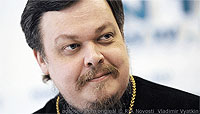Russian Orthodox Church calls for solution of vital social problems

(Interfax / Religion – Moscow, October 18, 2013) The Moscow Patriarchate has called on people of other religions for dialogue aimed at finding real solutions to social problems.
“It is very important not to limit religious dialogue to statements on friendship and peace. We did it all under the Soviets and in the first years after the collapse of the Soviet Union. Religious dialogue should not be soothing and comforting. We should determine the problems that face our society and propose solutions to those problems together,” Archpriest Vsevolod Chaplin, the head of the Synodal Department for Church and Society Relations, told a press conference in Moscow on Friday.
He believes religious figures should react to problems, including those involving extremism and illegal migration, together.
“A whole number of events occurred in the past few days that “may seriously jeopardize the good relations in Russia between people of different ethnic origins and religions, and these good relations are one of the most important foundations of stable, peaceful, and good life in our country,” the priest said.
He recalled that, besides the riots in Biryulyovo, unknown individuals had hacked the website of the Council of Muftis on the Muslim holiday Eid al-Adha, nationalists tried to carry out provocations in St. Petersburg to fan ethnic feuds, and a church has been attacked in Moscow.
Russia’s ill-wishers want to deprive the country of this foundation, and people who love Russia should do everything to maintain ethnic and religious peace, Father Vsevolod said.
“We are getting the impression that someone really wants to drive a wedge between people of different ethnic origins and religions in Russia,” he said.
Kharis Saubyanov, deputy head of the Russian Council of Muftis, said commenting on the recent events in Biryulyovo that what happened there was “a result of infrastructure problems and the local authorities’ indifferences to the needs of the local population.”
No locals worked at the vegetable warehouse in Biryulyovo and everyone who worked there was driven by “a desire to gain” and no one considered local residents’ wellbeing, he said.
Saubyanov said his daughter once lived in this district of Moscow and had to leave because she feared for her safety.
Rabbi Zinovy Kogan, deputy president of the Congress of Jewish Religious Communities, said, commenting on ethnic conflicts, that religious figures should be “one step ahead of the OMON police” and should be more involved in the problems of the people living on the territories that fall under their responsibility.
